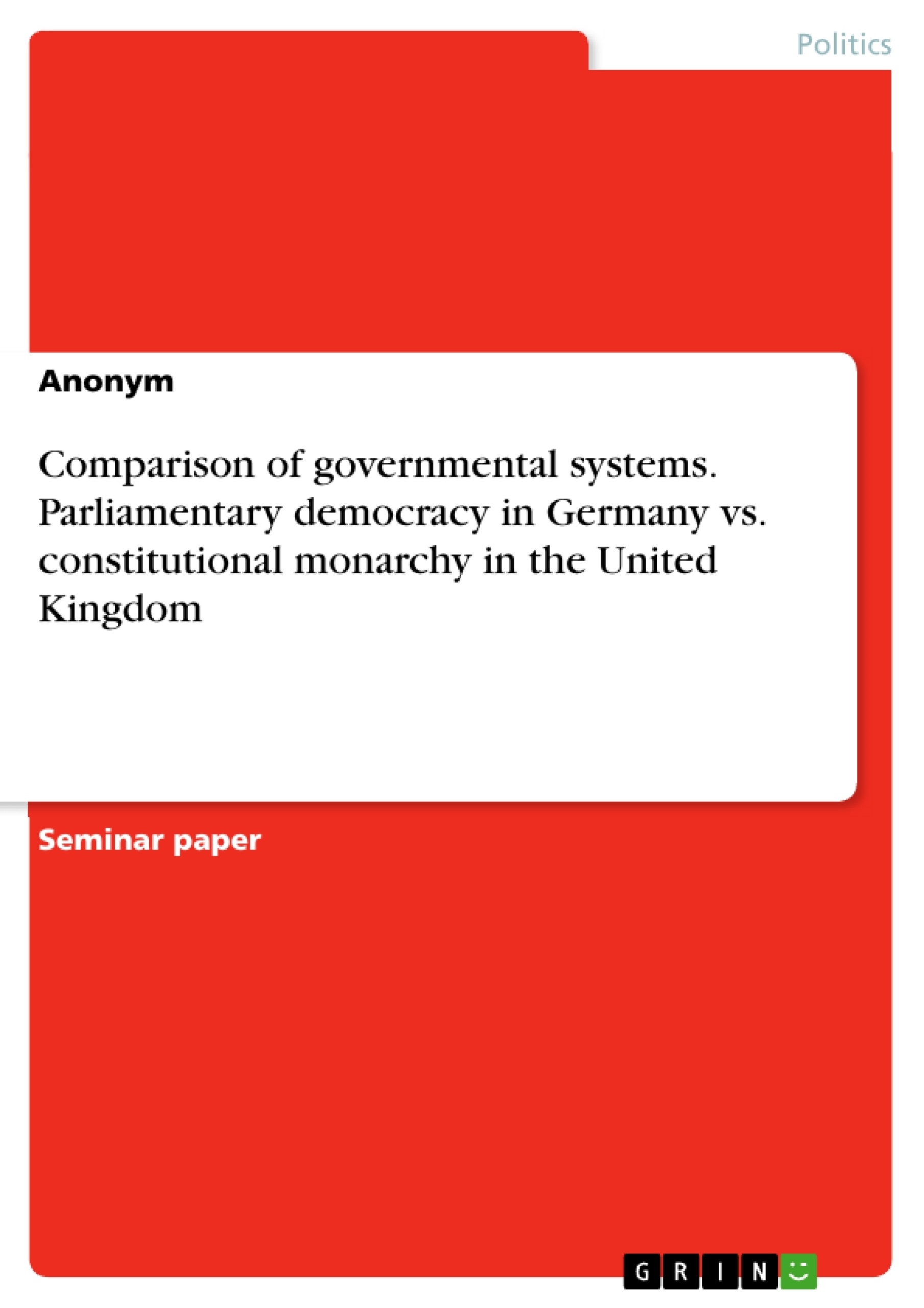This paper compares the British and German political system.
The first part describes the parliamentary democracy in Germany. The second part shows the constitutional monarchy in the United Kingdom.
The target is to find out what the advantages and disadvantages of a parliamentary democracy and a constitutional monarchy are.
Table of Contents
- 1 Introduction
- 1.1 A Persuasive Thesis Statement on Which is the better governmental system? The German or the British one?
- 1.2 Introduction
- 1.3 Methodology
- 2 Body
- 2.1 Governmental system of Germany
- 2.2 Governmental system of the United Kingdom
- 2.3 Comparison: Similarities and differences
- 3 Conclusion
- 4 Bibliography
Objectives and Key Themes
The objective of this work is to compare the governmental systems of Germany and the United Kingdom, analyzing their strengths and weaknesses to determine which system provides citizens with greater political influence. The analysis considers the structures of each system, the roles of different branches of government, and the overall impact on citizen participation.
- Comparison of Parliamentary Democracy and Constitutional Monarchy
- Analysis of Citizen Political Influence in Germany and the UK
- Examination of the Strengths and Weaknesses of Each Governmental System
- Evaluation of the Effectiveness of Each System in Representing Citizen Interests
- Assessment of the Role of Different Branches of Government in Each System
Chapter Summaries
1 Introduction: This introductory chapter lays out the thesis that despite the symbolic representation of the British monarch, the German parliamentary democracy offers citizens greater political influence. It establishes the focus on comparing the German and British governmental systems, highlighting the author's intention to analyze the advantages and disadvantages of each, ultimately aiming to determine which system better empowers its citizens.
2 Body: This section delves into a detailed comparison of the German and British governmental systems. It begins by outlining the three-tiered structure of German government (commune, federal state, and national levels), explaining the responsibilities and functions of each level, and the mechanisms for citizen participation in each tier. The structure and powers of the Bundestag, Bundesrat, and Bundesregierung are examined. A similar breakdown is anticipated for the UK's system, focusing on the interaction between the monarchy, parliament, and the executive branch. Finally, a comparative analysis of similarities and differences between the two systems is expected, providing a basis for the concluding assessment.
Keywords
German governmental system, United Kingdom governmental system, parliamentary democracy, constitutional monarchy, citizen political influence, Bundestag, Bundesrat, Bundesregierung, comparison of governmental systems, political participation.
Frequently Asked Questions: A Comparison of the German and British Governmental Systems
What is the main objective of this academic work?
The primary goal is to compare the governmental systems of Germany and the United Kingdom, analyzing their strengths and weaknesses to determine which system better empowers citizens politically.
What are the key themes explored in this analysis?
The analysis focuses on comparing parliamentary democracy and constitutional monarchy, assessing citizen political influence in both countries, examining the strengths and weaknesses of each system, evaluating their effectiveness in representing citizen interests, and assessing the roles of different branches of government.
What is the structure of the document?
The document includes an introduction establishing the thesis and methodology, a body section detailing the German and UK governmental systems and comparing them, a conclusion, and a bibliography. A table of contents provides a clear overview of the chapters and sub-sections.
How does the introduction lay the groundwork for the analysis?
The introduction presents a thesis arguing that despite the symbolic nature of the British monarchy, the German parliamentary democracy offers citizens greater political influence. It outlines the scope of the comparison, focusing on the advantages and disadvantages of each system to determine which better empowers its citizens.
What does the body section cover in detail?
The body section provides a detailed comparison of the German and UK systems. For Germany, it explains the three-tiered structure (commune, federal state, national), the responsibilities of each level, and mechanisms for citizen participation. It examines the Bundestag, Bundesrat, and Bundesregierung. A similar breakdown is provided for the UK, focusing on the interaction between the monarchy, parliament, and the executive branch. Finally, a comparative analysis highlights similarities and differences.
What keywords are used to describe the topic?
Keywords include: German governmental system, United Kingdom governmental system, parliamentary democracy, constitutional monarchy, citizen political influence, Bundestag, Bundesrat, Bundesregierung, comparison of governmental systems, and political participation.
What is the anticipated conclusion of the work?
While not explicitly stated in the provided summary, the conclusion will likely present a final assessment based on the comparative analysis in the body section, supporting or refuting the initial thesis regarding which system offers greater citizen political influence.
- Quote paper
- Anonym (Author), 2016, Comparison of governmental systems. Parliamentary democracy in Germany vs. constitutional monarchy in the United Kingdom, Munich, GRIN Verlag, https://www.grin.com/document/386608




